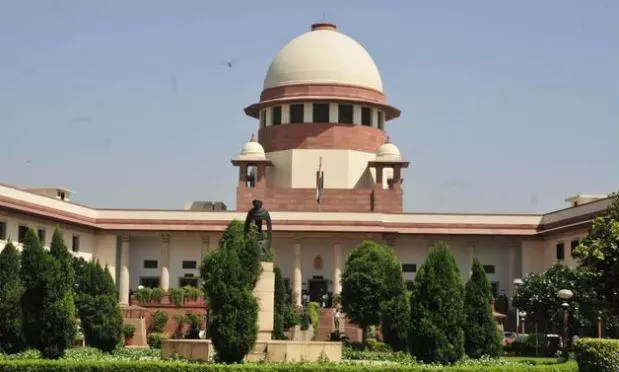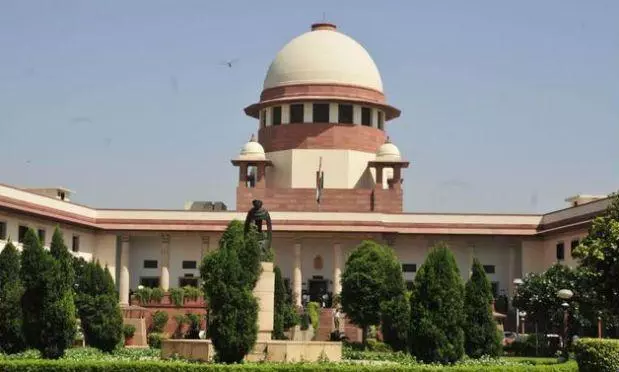
New Delhi: Flagging concerns over lack of institutional safety norms in medical establishments across the country, the Supreme Court on Tuesday constituted a 10-member national task force (NTF) to formulate a protocol for ensuring the safety and security of doctors and other health care professionals amid spiralling nation-wide protests over the rape and murder of a trainee doctor at the R.G. Kar Medical College and Hospital in Kolkata.
The apex court underscored that the safety and well-being of doctors is a matter of national interest and said that the task force will submit its interim report within three weeks and the final report within two months.
A bench headed by Chief Justice of India D.Y. Chandrachud was hearing a suo moto case relating to the government-run Kolkata hospital incident that has triggered a nationwide uproar.
The top court also asked the CBI to submit a status report on progress of the probe into the case and appealed to the protesting doctors to resume their duties. It tasked the CISF to provide security at the Kolkata hospital in order to inspire confidence so that the doctors can resume their duties.
Expressing its ire over the delay in the registration of the FIR and failure in checking vandalism at the hospital premises, the apex court asked the Kolkata police to submit a status report on the probe by Thursday.
The CJI said: “As horrific details have emerged in the course of media reportage, the brutality of the sexual assault and the nature of the crime have shocked the conscience of the nation… In the aftermath of the brutal incident and the demonstrations which followed, the state government was expected to ensure the deployment of the state machinery to prevent a breach of law and order. It was all the more necessary to do so since an investigation of the crime that took place in the precincts of the hospital was under way. We are unable to comprehend how the state was not prepared to deal with the incident of vandalisation of the premises of the hospital…”
The CJI also observed that the name and graphic images of the deceased have been widely circulated on social media without regard to her privacy or dignity and ordered the removal of the name, photos and videos of a trainee doctor at R.G. Kar Medical College and Hospital from all social media platforms.
The top court, also comprising Justice J.B. Pardiwala and Manoj Misra, said the NTF headed by Vice Admiral Arti shall formulate effective recommendations to remedy the issues of concern pertaining to safety, working conditions and well-being of medical professionals and other cognate matters.
The bench criticised the ex-principal of R.G. Kar Medical College Dr Sandip Ghosh for trying to pass off the case as that of suicide and not letting the parents of the deceased see her body for several hours. It asked: “What was the principal doing? Why was this inaction to first pass this as suicide and not register an FIR?”
The bench observed: “The body is handed to the parents for cremation late in the night. On the next day, the doctors are on protest and a mob assembles at the hospital… The hospital is invaded and critical facilities are damaged. What was the police doing? A serious offence has taken place and the crime scene is within the hospital. The police should have protected the crime scene. How can the police allow vandals to enter the hospital? After the principal resigned, he was sent to another hospital. When his conduct was under scrutiny, how was he appointed to another college immediately?”
The bench said what has taken place in Kolkata is not just a horrific murder but an incident that has raised systemic issues about the safety of doctors. It said: “We are deeply concerned that there is a virtual absence of safe work conditions across the country, particularly in public hospitals. Most of the young doctors have to put in 36 hours of work…We find that there are no duty rooms available or separate restrooms for men and women doctors and nursing staff. We must evolve a national consensus that there must be a national standard protocol so that safe work conditions are provided…If women cannot go to their place of work safely, then we are denying them equality.”
Senior advocate Kapil Sibal, appearing for the West Bengal government, refuted the observations and submitted that Kolkata police took all necessary action. He said he will place on record all the facts. “Photos and videos were circulated before the police reached the crime scene. We didn’t allow anything to happen and cordoned off the area. An inquest was done and a case of unnatural death was registered immediately. We caught the culprit, who was a civic worker. This is not adversarial litigation,” he told the bench.
Solicitor-general Tushar Mehta said a mob of 7,000 people could not have assembled at the hospital without the knowledge and consent of the police. “Let the West Bengal government not be in denial mode; there is complete failure of law and order in the state. A girl has lost her life due to a sexual pervert and an animal,” he said.
Mr Sibal said over 50 FIRs have been registered following the vandalism incident and 37 people have already been arrested.
During the hearing, the top court asked the West Bengal government to not take coercive action against people holding peaceful protests and speaking up on social media. “Let not the power of the state of West Bengal be unleashed upon peaceful protesters. Let us deal with them with great sensitivity. This is a moment for national catharsis,” the court said.
The Supreme Court, which directed the Central Bureau of Investigation to submit a status report on the progress made in its investigation into the killing, also asked the state government to submit a report on the action it has taken against the vandals.
The CJI said: “Medical associations have consistently raised issues of the lack of workplace safety in health care institutions. Medical professionals in the performance of their duties have been unfortunate targets of various forms of violence. Hospitals and medical care facilities are open throughout the day and night. Medical professionals — doctors, nurses and paramedic staff — work round the clock. Unrestricted access to every part of healthcare institutions has made healthcare professionals susceptible to violence…”
The CJI said: “We have attempted to flag here the ground reality indicating the lack of institutional safety standards in health care establishments.”
He also listed a non-exhaustive formulation to ensure safety at medical institutions, including the provision of adequate resting spaces for medical professionals who are posted for night duties as interns, residents and senior residents and are made to perform thirty-six hour shifts in conditions where even basic needs of sanitation, nutrition, hygiene and rest are lacking.
The CJI said there is an absence of uniformity in terms of a standard national protocol.
The top court said: “The lack of institutional safety norms at medical establishments against both violence and sexual violence against medical professionals is a matter of serious concern… As more and more women join the workforce in cutting-edge areas of knowledge and science, the nation has a vital stake in ensuring safe and dignified conditions of work. The constitutional value of equality demands nothing else and will not brook compromises on the health, well-being and safety of those who provide health care to others. The nation cannot await a rape or murder for real changes on the ground.”
A trainee doctor’s body with severe injury marks was found inside the seminar hall of Kolkata’s at R.G. Kar Medical College and Hospital’s chest department on August 9. A civic volunteer was arrested by the Kolkata police the following day for his alleged involvement in the rape-murder incident.
